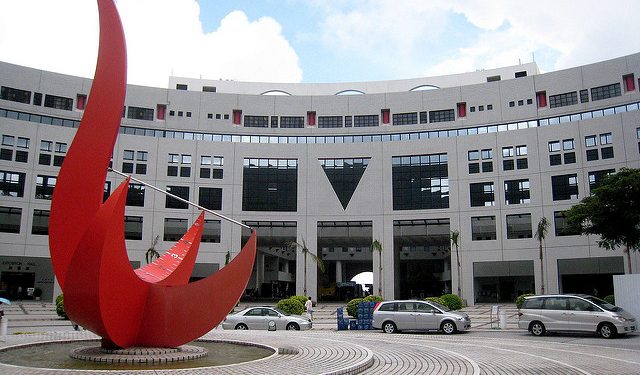Hong Kong universities need to be more international as non-mainland foreign students made up only 3.9% of total enrolment in 2015/16, while accommodation and academic space are lacking, said the city’s official auditor.
News and business analysis for Professionals in International Education
Have some pie!
Hong Kong universities told to curb recruitment from mainland China
 The Hong Kong University of Science and Technology has the highest percentage of non-local students not from mainland China, 8.4%. Photo: Alan Levine.
The Hong Kong University of Science and Technology has the highest percentage of non-local students not from mainland China, 8.4%. Photo: Alan Levine. The findings were highlighted in the latest report by the Hong Kong Audit Commission on university funding over the past academic year, which found that 76% of all non-local students in eight public universities came from mainland China.
“While it is important to encourage mainland students to enter Hong Kong universities, true internationalisation requires a much greater diversity of nationalities and cultural background,” the report said, citing the 2010 higher education review report published by the University Grants Committee, the government’s university affairs adviser.
“Internationalisation requires a much greater diversity of nationalities and cultural background”
In 2015/16, there were 15,730 non-local students enrolled in programmes funded by the UGC, representing 16% of total student enrolment. The Hong Kong University of Science and Technology had the highest percentage of non-local students not from mainland China, accounting for 8.4%, while the Education University of Hong Kong had the lowest percentage with only 0.3%.
Speaking to The PIE News, a spokesperson for the Hong Kong University of Science and Technology agreed that the city should be more proactive to promote its strengths globally in higher education, as competition for “top-notch faculty, researchers and students” intensifies.
“Universities in Hong Kong should tell the world that Hong Kong is not only an international and multi-cultural cosmopolitan city that welcomes and embraces first-class scholars and talents,” they said. “But the city also has highly-regarded academic standing, as well as a well-established research, teaching and learning environment.”
With the highest proportion of non-local students not from mainland China, HKUST has been actively forging ties with its international counterparts, according to Tam, having now partnered with over 250 universities.
“This is not only to build a global presence so as to attract top faculty and students from around the world, but also to facilitate exchange opportunities for our local students,” the spokesperson said.
However, not everyone in Hong Kong’s higher education sector has reacted positively to the commission’s charges. Professor Cheng Kai-ming, a former senior manager of the University of Hong Kong told Hong Kong media that the report had shown “ignorance of the international scene” where students from mainland China made up the bulk of overseas student intake globally.
Students from mainland China also often outperform other non-local students academically, Cheng added.
A spokesperson from the Education University said the university’s flagship education programmes might not be attractive to foreign students, many of whom do not wish to pursue qualifications in education in Hong Kong.
“The report shows ignorance of the international scene”
A lack of hostels and academic space provided by Hong Kong universities means students will miss out on a quality study experience, the auditor also advised, while another concern was raised about university spending on academics from overseas, which grew fourfold from HK$3.9 million to HK$16.2 million over a decade.
The auditor found that while all quoted rates for hotel stays for foreign academics were from the same five upmarket hotels from 2005/06 to 2015/16, there was no documentary evidence showing justifications.
The auditor called for greater efforts to be made in implementing the recommendations of the UGC’s 2010 higher education review report, which also advised universities to actively maintain an international mix of academic staff.
Universities should agree on a set of key performance indicators on internationalisation with the UGC, and continue to be monitored on their activities, the auditor said. “The UGC sees internationalisation as the key to Hong Kong’s future and a matter of priority for the universities,” the report reads.
Responding to the audit, Secretary for Education of Hong Kong, Eddie Ng, said the UGC will carefully examine the findings and improve its workings accordingly.
Still looking? Find by category:



I feel Hong Kong should focus and encourage international students …Ifeel a good a mix of 40% of international students of the total intake is a good bet in terms of developing academic excellence and also developing the international presence